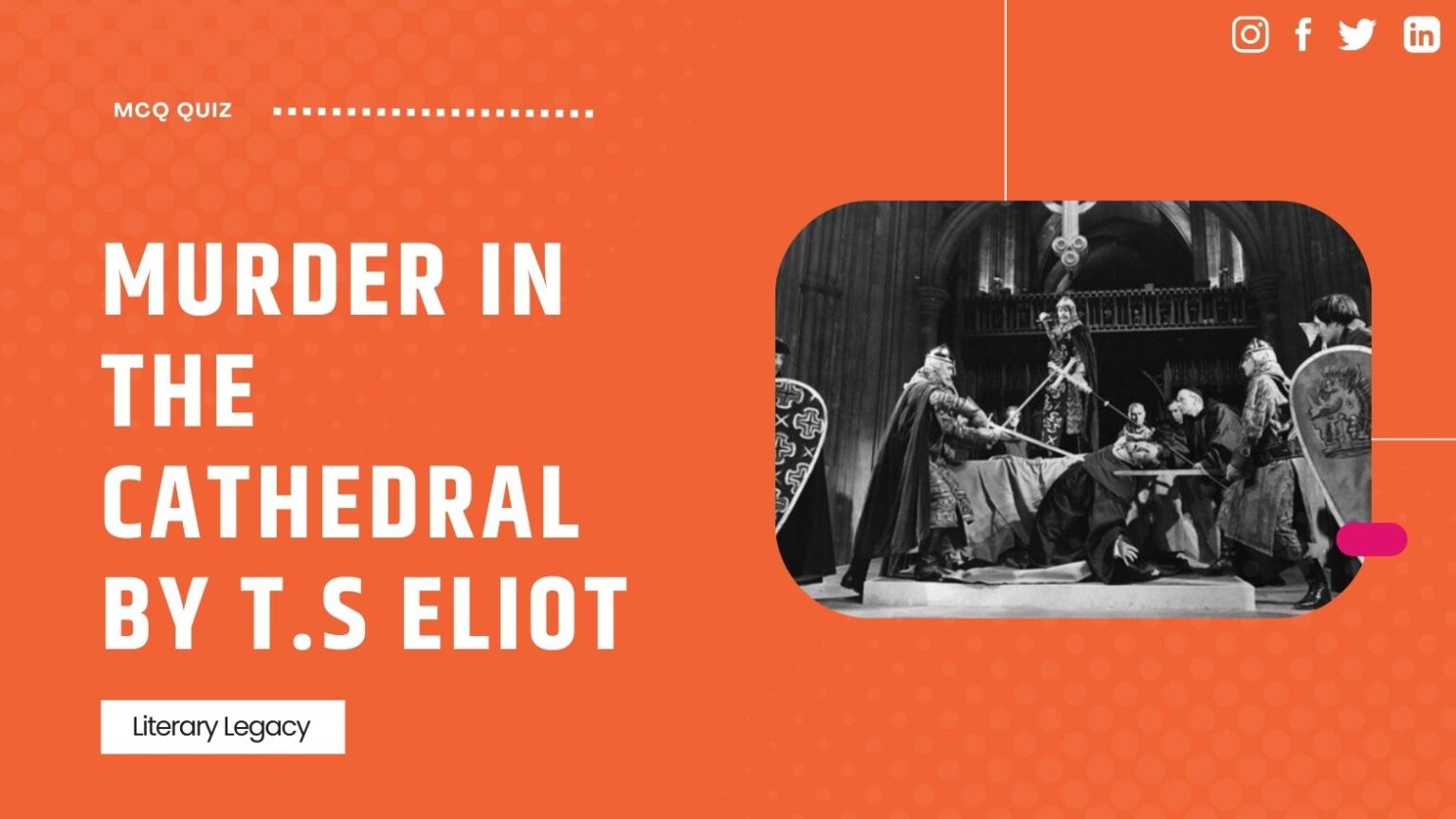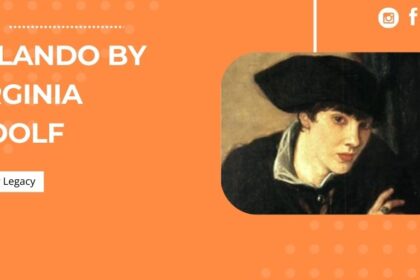1. What is the main concern of the Chorus regarding Becket’s return to Canterbury?
A) They want him to take a more political approach as Archbishop.
B) They believe Becket will bring wealth to the congregation.
C) They fear his return will lead to his death and their own turmoil.
D) They think he will abandon his religious duties.
Answer: (C)
They fear his return will lead to his death and their own turmoil.
The Chorus expresses a deep concern that Becket’s return would stir up conflicts leading to his possible death.
2. What role do the four tempters play in Becket’s return to Canterbury?
A) They seek to convince Becket to leave Canterbury again.
B) They are loyal supporters of Becket’s spiritual mission.
C) They assist Becket in strengthening his political power.
D) They represent various earthly desires and temptations for Becket.
Answer: (D)
They represent various earthly desires and temptations for Becket.
The four tempters attempt to persuade Becket into adopting views that favor political power over his spiritual responsibilities.
3. What significant decision does Becket ultimately make regarding his fate?
A) He decides to return to France to avoid conflict.
B) He accepts martyrdom as his fate in devotion to God.
C) He chooses to pursue political power over religious duties.
D) He plans to confront King Henry II about their conflicts.
Answer: (B)
He accepts martyrdom as his fate in devotion to God.
Becket resolves that martyrdom is his true calling, prioritizing spiritual commitment over worldly ambitions.
4. How long had Becket been away from Canterbury before his return?
A) Seven years
B) Five years
C) Ten years
D) Three years
Answer: (A)
Seven years
Becket had been away from Canterbury for seven years due to conflicts with King Henry II.
5. Which group of characters welcomes Becket back to Canterbury?
A) The citizens of Canterbury
B) King Henry II’s supporters
C) The Chorus
D) Three priests who served under him
Answer: (D)
Three priests who served under him
The three priests, who had previously served under Becket, welcome him back to Canterbury despite the Chorus’s concern.
6. What perspective does Becket ask the congregation to consider regarding sainthood?
A) A practical perspective considering political implications.
B) A simplified view of saintliness.
C) A human perspective focused on virtue.
D) A divine perspective emphasizing suffering.
Answer: (D)
A divine perspective emphasizing suffering.
Becket encourages the audience to consider sainthood from a divine perspective, highlighting that true sainthood often comes through suffering.
7. What perspective does Becket ask the congregation to consider regarding sainthood?
A) A practical perspective considering political implications.
B) A simplified view of saintliness.
C) A human perspective focused on virtue.
D) A divine perspective emphasizing suffering.
Answer: (D)
A divine perspective emphasizing suffering.
Becket encourages the audience to consider sainthood from a divine perspective, highlighting that true sainthood often comes through suffering.
8. What title did Henry II appoint Becket to before he became Archbishop?
A) Prime Minister of England
B) Lord of the Manor
C) Chancellor of England
D) Governor of Canterbury
Answer: (C)
Chancellor of England
Becket was appointed as the Chancellor of England before taking on the role of Archbishop.
9. What motivates Becket’s refusal to go into hiding when the knights threaten him?
A) His hope for reconciliation with Henry II.
B) His belief in the knights’ integrity.
C) His desire to protect the church’s reputation.
D) His commitment to his faith and martyrdom.
Answer: (D)
His commitment to his faith and martyrdom.
Becket is fully committed to his martyrdom and refuses to hide when threatened by the knights.
10. How do the priests initially respond to the threat posed by the knights?
A) They prepare to confront the knights directly.
B) They take up arms to defend the cathedral.
C) They negotiate with the knights.
D) They plead with Becket to escape.
Answer: (D)
They plead with Becket to escape.
The priests try to persuade Becket to go into hiding to protect him from the knights.
11. What does Becket insist should be made public regarding his situation with Henry II?
A) The king’s request for him to resign.
B) The specific charges against him.
C) The knights’ loyalty to the crown.
D) The support from the congregation.
Answer: (B)
The specific charges against him.
Becket believes that if the king has charges against him, the public should know what they are and witness his defense.
12. What fate befalls Becket at the end of the encounter with the knights?
A) He is rescued by the priests.
B) He is killed by the knights.
C) He escapes to France.
D) He is taken prisoner by the knights.
Answer: (B)
He is killed by the knights.
Becket is ultimately killed by the knights in the cathedral.
13. What do the four knights argue after Becket’s death?
A) Their decision was justified in defense of the crown.
B) They acted out of loyalty to Becket.
C) They were misled by Henry II’s orders.
D) They were compelled by the church’s policy.
Answer: (A)
Their decision was justified in defense of the crown.
The knights present arguments to defend their decision to murder Becket, justifying it as an act of loyalty to the king.
14. What is the overarching emotion expressed by the Chorus after Becket’s death?
A) Joy for the martyrdom.
B) Despair and pain over the tragedy.
C) Anger towards the knights.
D) Relief for his sacrifice.
Answer: (B)
Despair and pain over the tragedy.
The Chorus expresses deep pain and desperation in response to Becket’s death.
15. What did Becket say about the doors of the cathedral when the knights arrived?
A) They must remain closed to protect the faithful.
B) They can only be opened by church officials.
C) It is against policy to bar anyone from entering.
D) They should be opened only for the king’s men.
Answer: (C)
It is against policy to bar anyone from entering.
Becket insisted that the doors be opened as it was against the Church’s policy to exclude anyone from entering the cathedral.
16. What conventional belief about sainthood does Becket challenge in his sermon?
A) Sainthood must come without hardship.
B) Saints are always victorious.
C) Saintliness does not require public recognition.
D) Saints are never flawed.
Answer: (A)
Sainthood must come without hardship.
Becket challenges the idea that sainthood is attained without experiencing great suffering.
17. What is the main reason the Chorus expresses for not wanting Thomas Becket to return?
A) They have grown accustomed to life without him.
B) They feel abandoned by him in the past.
C) They believe his leadership is ineffective.
D) They fear his presence will bring more suffering.
Answer: (D)
They fear his presence will bring more suffering.
The Chorus fears that Becket’s return would increase their suffering to an unbearable level.
18. Which group does the Chorus specifically mention as preferring to be left alone?
A) The barons and nobles
B) The common women of Canterbury
C) The wealthy merchants
D) The residents of Canterbury
Answer: (B)
The common women of Canterbury
The Chorus is made up of common women who desire to be unbothered by the wealthier classes.
19. What is the emotional state of the Chorus regarding their current situation?
A) They are unhappy but unwilling to express it.
B) They long for change and improvement.
C) They are entirely satisfied with their lives.
D) They are content with their relative dissatisfaction.
Answer: (D)
They are content with their relative dissatisfaction.
The Chorus expresses that they have a level of contentment with their current state of relative dissatisfaction.
20. How long has it been since Thomas Becket left Canterbury, according to the Chorus?
A) Ten years
B) Seven years
C) Twelve years
D) Five years
Answer: (B)
Seven years
The Chorus states that it has been seven years since Becket left.
21. What type of authority do the Chorus members claim to be affected by?
A) Coercive authority
B) Civic authority
C) Financial authority
D) Religious authority
Answer: (A)
Coercive authority
The Chorus mentions that the wealthier members of society lord their power over them in a coercive fashion.
22. What do the priests perceive as the primary motivation behind temporal power?
A) To promote the common good
B) To support spiritual authority
C) To seize and maintain greed and lustful power
D) To uphold justice and order
Answer: (C)
To seize and maintain greed and lustful power
The priests clearly state that the motivation behind temporal power is rooted in greed.
23. How do the priests view the relationship between spiritual power and worldly power?
A) They view them as often conflicting
B) They believe both powers are equally important
C) They see them as completely aligned
D) They think spiritual power supersedes worldly power
Answer: (A)
They view them as often conflicting
A clear divide between worldly and spiritual power is established, indicating conflict.
24. What is the herald’s message regarding Becket’s return to England?
A) It signifies a complete resolution of the feud
B) It foreshadows increased turmoil despite a seemingly cheerful appearance
C) It marks the end of all political intrigues
D) It will lead to peace for the Archbishop and the Church
Answer: (B)
It foreshadows increased turmoil despite a seemingly cheerful appearance
The herald’s message suggests that Becket’s return will bring more conflict, not peace.
25. What is the second priest’s concern about Archbishop Becket while he is abroad?
A) He is doing well and gaining influence
B) He is caught up in a political battle in England
C) He may have lost sight of his spiritual duties
D) His actions are unclear amid political intrigue
Answer: (D)
His actions are unclear amid political intrigue
The second priest wonders about Becket’s actions abroad in the context of political intrigue.
26. How does the first priest feel about Becket’s position in the political realm?
A) He believes Becket is well-suited for political power
B) He supports Becket’s political maneuvers
C) He thinks Becket is an outsider in the world of politics
D) He is indifferent to Becket’s role
Answer: (C)
He thinks Becket is an outsider in the world of politics
The first priest expresses concern that Becket is out of place in political power.
27. What does the third priest mean by stating he sees nothing ‘conclusive’ in temporal governance?
A) He implies that political decisions are rarely effective or dignified
B) He believes temporal power is essential for society
C) He thinks the outcomes of political actions are predictable
D) He believes all temporal decisions lead to positive outcomes
Answer: (A)
He implies that political decisions are rarely effective or dignified
The third priest’s comment indicates a lack of faith in the effectiveness of temporal governance.
28. What key theme is introduced through the priests’ discussion about Becket and the king?
A) The inevitability of political power struggles
B) The emotional ties between friends and foes
C) The conflict between loyalty and guilt
D) The strength of spiritual authority over politicians
Answer: (C)
The conflict between loyalty and guilt
The theme of loyalty and guilt arises from the conflict between Becket and the king.
29. Why does the first priest inquire about the resolution of the feud between Becket and the king?
A) He is oblivious to their conflict
B) He is trying to mediate between them
C) He has been instructed to gather intelligence
D) He wishes to know if peace is restored
Answer: (D)
He wishes to know if peace is restored
The first priest’s inquiry reflects concern for the Archbishop and the Church’s well-being.
30. What does the absence of ‘effective, dignified, or merited’ governance suggest about the priests’ view of temporal leaders?
A) They respect the moral qualities of these leaders
B) They consider temporal leaders essential for governance
C) They see temporal leaders as fundamentally corrupt
D) They believe temporal leaders are misunderstood
Answer: (C)
They see temporal leaders as fundamentally corrupt
The priests’ views suggest that they have a bleak perception of the ethical standards of temporal leaders.
31. What is the main reason the priests feel confident about political problems they might face?
A) They have no political concerns at all.
B) They think the barons will side with them.
C) They believe the king supports them.
D) They trust in Becket’s spiritual leadership.
Answer: (D)
They trust in Becket’s spiritual leadership.
The priests’ confidence stems from their faith in Becket’s guidance during potential hardships.
32. How does the third priest view the unfolding of fate?
A) He suggests they must accept good and bad outcomes.
B) He argues that fate can be changed through prayer.
C) He believes it is solely based on human action.
D) He thinks it is entirely predictable.
Answer: (A)
He suggests they must accept good and bad outcomes.
The third priest believes in accepting the passage of time and the outcomes it brings, whether good or bad.
33. What is the Chorus’s primary concern regarding Becket’s return to Canterbury?
A) They want him to remain in France permanently.
B) They believe he will bring about doom.
C) They fear he may become too powerful.
D) They hope to challenge his authority.
Answer: (B)
They believe he will bring about doom.
The Chorus fears that Becket’s return will lead to negative consequences for their community.
34. How do the other priests regard the Chorus’s fears about Becket’s return?
A) They encourage the Chorus to express their concerns openly.
B) They agree that the fears are valid and serious.
C) They dismiss the fears as foolish and immodest.
D) They believe more discussion is necessary.
Answer: (C)
They dismiss the fears as foolish and immodest.
The second priest calls the Chorus’s fears foolish, suggesting he has little patience for their concerns.
35. What does the phrase ‘living and partly living’ imply about the Chorus’s experience?
A) They have felt no difference since Becket’s departure.
B) They have struggled with their existence without Becket.
C) Their life has been completely fulfilling.
D) They have been enjoying life to its fullest.
Answer: (B)
They have struggled with their existence without Becket.
The Chorus describes their life as troubling and only tolerable during their years apart from Becket.
36 What does the third priest suggest about the nature of good and evil?
A) Good can always triumph over evil.
B) They are hard to comprehend fully.
C) They are determined by social status.
D) They are easily understood concepts.
Answer: (B)
They are hard to comprehend fully.
The third priest states that the true nature of good and evil cannot be fully comprehended.
37. What impact does Becket’s potential conflict with the king have on the priests?
A) They feel indifferent to the situation.
B) They believe it will harm their church’s reputation.
C) They worry that Becket may abandon them.
D) They anticipate that they will be guided through hardships.
Answer: (D)
They anticipate that they will be guided through hardships.
The priests are confident that Becket will lead them through the hardships they might face.
38. What is implied about the divine plan in relation to the priests’ faith?
A) They believe it will always align with their desires.
B) They feel it will unfold regardless of their actions.
C) They think it is irrelevant to their worries.
D) They hope to gain control over it.
Answer: (B)
They feel it will unfold regardless of their actions.
The priests express a belief that the unfolding of events will happen according to God’s plan, regardless of their efforts.
39. What does the second priest’s attitude toward the Chorus reveal about his character?
A) He encourages open discussion.
B) He is nurturing and empathetic.
C) He is indecisive and confused.
D) He is dismissive and condescending.
Answer: (D)
He is dismissive and condescending.
The second priest’s condescending remarks suggest he does not take the Chorus seriously and feels superior.
40. What theme is primarily explored through the priests’ discussion regarding Becket’s leadership?
A) The inevitability of fate in human life.
B) The balance between spiritual guidance and worldly affairs.
C) The struggle for political power among church leaders.
D) The conflict between individual desires and communal needs.
Answer: (B)
The balance between spiritual guidance and worldly affairs.
The discussion highlights the tension between spiritual leadership and the political issues faced by the Church.



